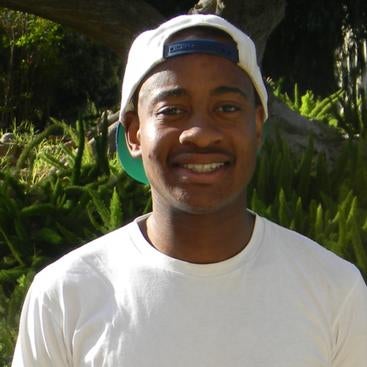DEI Dispatch - Scientist Spotlight
Patrick Thomas promotes inclusion efforts at UCR and the American Society of Plant Biologists
We’re super excited to highlight Patrick Thomas. Patrick is a PhD candidate in Dr. Linda Walling’s research group and he studies Whitefly resistance and hormone responses in alfafa, and he has been balancing this exciting research with participation in a variety of inclusivity activities. We wanted to catch up with Patrick to see what he currently has on his docket.

Tell us a little bit about your research. What’s are you working on right now?
I'm currently focused on identifying the genetic mechanism behind a resistance mechanism to whiteflies in alfalfa. Whiteflies are an invasive pest with a huge host range. As climate change becomes an increasing threat, the porspects of superabundant whitefly populations threatens agriculture. The hope with my project was to identify resistant phenotypes and genotypes from alfalfa populations bred by Dr. Larry Teuber. I've successfully screened 84 lines. I've also managed to identify a highly resistant genotype and I am currency analyzing some transcriptomic data from an infestation time course we did on a resistant and susceptible line. We've found some phytohormone responses that are quite interesting and I'm currently doing PCRs to verify my findings and writing up data in manuscripts.
You’re currently the head of the American Society of Plant Biologists’ Early Career Plant Scientists’ Equity, Diversity and Inclusion committee. Could you tell us a little bit about this position? What do you as part of this committee?
My role as the EDI Subcommittee chair for ASPB ECPS puts me in a position where I create programming for early career plant biologists centered around diversity and equity. The position was formed in 2020 so outside of meeting requirements, I have the freedom to provide resources for the community however they are needed. It's been a challenge with COVID because I think folks are "Zoomed out" but we've had success with some workshops and we're always looking for suggestions!
What are some of the other EDI efforts that you participated in before the EPS EDI committee?
Before EDI, I was a mentor to a high school student for three years (Esther Koh) and an undergraduate from BIOL 020 (Hani Jandali) as a part of my GAANN fellowship. That experience inspired me to be hired as the GradSuccess GSMP STEM Coordinator from 2018-2020. In undergrad, I had the honor of being a McNair Scholar (2012 - 2014) and I also served as Treasurer (2011 - 2013) and President (2013-14) of Penn State's MANRRS Chapter.
What motivated your decision to pivot your efforts to a professional organization?
I was actually approached to be the coordinator of ECPS's EDI Subcommittee in the summer of 2020. Considering the climate, it felt right and I was beginning to think about my departure from UCR. Targeting my efforts to a professional organization would change the way I serve my community, but still keep me connected to UCR. I felt a bit like a "big fish in a small pond" and this allowed me to shake that role.
What advice do you have for other graduate students who are trying to navigate EDI work during graduate school?
I think the best advice I have is to take care of yourself first (particularly as a marginalized person). Institutional survival is important and while you should want to help push towards equity, you can't do it at the cost of yourself. Outside of that, I think the best way to serve people if you don't know what to do is to inquire. There are always issues of inequity around you and people who need a voice. Respectful inquiry can help you champion a cause that is worthwhile to underrepresented or marginalized folks.
You’re on the final stretch of your PhD, what plans do you have lined up next?
Next up, I plan on taking my talents back to my alma mater where I will be a postdoctoral researcher at Penn State for Drs. Mark Guiltinan and Siela Maximova looking at disease resistance in cacao. Still not too sure what I want to do long term, but I'm hoping a few months hidden away in Happy Valley will provide inspiration. Long term, I think I want to launch a community-based think tank centered around teaching people about agriculture, food production, and plant biology.